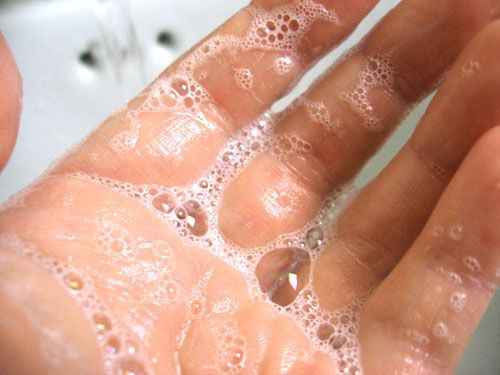Chemical Widely Used in Hand Sanitizers and Mouthwash May Weaken Muscles

An antibacterial and antifungal chemical commonly used in hand soaps and other personal-care products may impair muscle function, scientists claim.
The latest findings reveal that triclosan, a chemical commonly found in antibacterial personal-care products like soaps, deodorants, mouthwashes, toothpaste, bedding, clothes, carpets, toys and trash bags, delays muscle contractions at a cellular level, and slows swimming in fish and cuts muscular strength in mice.
"Triclosan is found in virtually everyone's home and is pervasive in the environment," researcher Isaac Pessah, professor and chair of the Department of Molecular Biosciences at the University of California, Davis, said in a statement. "These findings provide strong evidence that the chemical is of concern to both human and environmental health."
The research, published in the Proceedings of the National Academy of Sciences, consisted of several experiments evaluating the effects of doses of triclosan that are similar to those that people and animals may be exposed to during everyday life.
Researchers found that triclosan decreased the ability of isolated samples of heart muscle cells and skeletal muscle fibers to contract. The team explained that, normally, isolated muscle fibers under electrical stimulation produce muscle contractions known as "excitation-contraction coupling" (ECC), which is the fundamental basis of any muscle movement, including heartbeats.
However, the presence of triclosan impaired the normal communication between two proteins functioning as molecular channels that control the flow of calcium ions to create muscle contractions.
Researchers also found that the chemical impaired the ability of the heart and skeletal muscle to contract in living animals. In the study, researchers found that mice had up to a 25-percent reduction in heart function after 20 minutes of exposure to triclosan.
"The effects of triclosan on cardiac function were really dramatic," study co-author Nipavan Chiamvimonvat, professor of cardiovascular medicine at UC Davis, said in a statement. "Although triclosan is not regulated as a drug, this compound acts like a potent cardiac depressant in our models."
Results of the study found that mice had an 18 percent reduction in grip strength for up to 60 minutes after being given a single dose of triclosan. Researchers explain that grip strength is commonly used to measure limb strength when investigating the effects of drugs and neuromuscular disorders.
In a third experiment on the effects of triclosan exposure on fathead minnows, a small fish frequently used as a model organism for studying impacts of aquatic pollutants, researchers found that seven days of triclosan exposure significantly reduced swimming activity in experimental fish compared to control fish during normal swimming and swim tests designed to imitate fish being threatened by a predator.
"We were surprised by the large degree to which muscle activity was impaired in very different organisms and in both cardiac and skeletal muscle," co-author Bruce Hammock, professor in the UC Davis Department of Entomology, said in a statement. "You can imagine in animals that depend so totally on muscle activity that even a 10-percent reduction in ability can make a real difference in their survival."
Past studies have also linked the antibacterial agent to other harmful health effects, like disruption of reproductive hormone activity and of cell signaling in the brain.
Researchers warned that because the results were based on animal models, additional research is needed to determine whether triclosan exposure affects humans in the same way.
However, they noted that because triclosan exposure appeared to produce the same results under different experimental conditions, the latest research provides strong evidence that triclosan could have effects on animal and human health at current levels of exposure.
"In patients with underlying heart failure, triclosan could have significant effects because it is so widely used," Chiamvimonvat said. "However, without additional studies, it would be difficult for a physician to distinguish between natural disease progression and an environmental factor such as triclosan."
More than one million pounds of triclosan are produced annually in the United States, the U.S. Environmental Protection Agency estimated in 1998, and the chemical can be detected in waterways and aquatic organisms ranging from algae to fish to dolphins and in human urine, blood and breast milk.
Researchers questioned arguments that triclosan, introduced more than 40 years ago, is safe partly because the chemical binds to blood proteins and becomes chemically inactive.
Researchers said that the fact that the antibacterial agent binds to blood proteins may actually help its transport to critical organs, and when the latest experiments were carried out in the presence of blood proteins, the disruption in muscle activity still occurred.
Triclosan was first developed to prevent bacterial infections in hospitals, but its use has become prevalent in antibacterial products for home-use.
However, other than triclosan's use in some toothpastes to prevent gingivitis, federal regulators said there is no evidence that the chemical provides other health benefits or that antibacterial soaps and body washes are more effective than regular soap and water.
Many experts also worry about the possibility of resistant bacterial strains developing with the overuse of antibacterial products.
Researchers said that because the chemical structure of triclosan bears a resemblance to other toxic chemicals in the environment, federal regulators are conducting new risk assessments of triclosan.
They argued that the current findings call for greater restrictions on the chemical.
"We have shown that triclosan potently impairs muscle functions by interfering with signaling between two proteins that are of fundamental importance to life," said Pessah. "Regulatory agencies should definitely be reconsidering whether it should be allowed in consumer products."



























